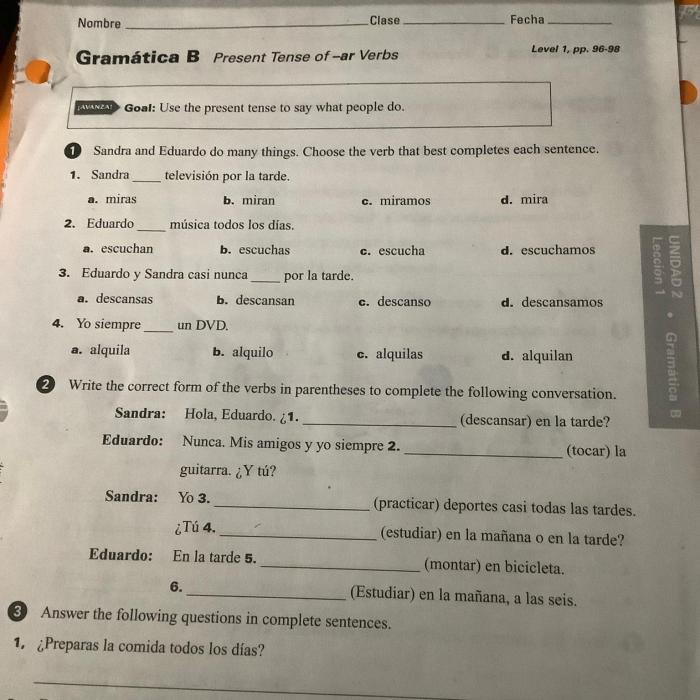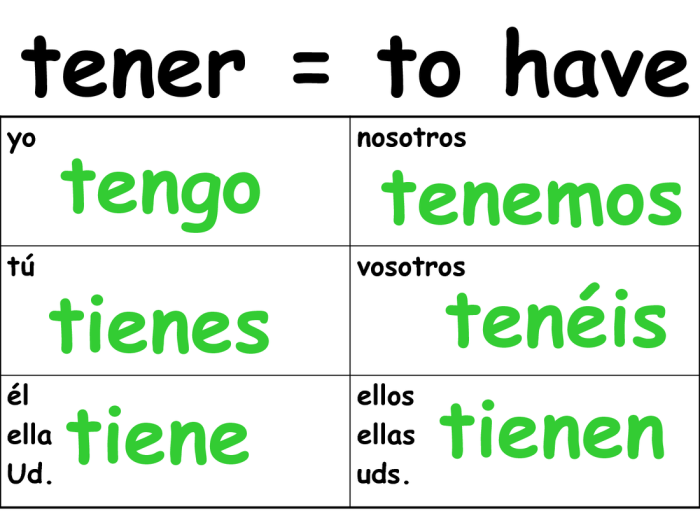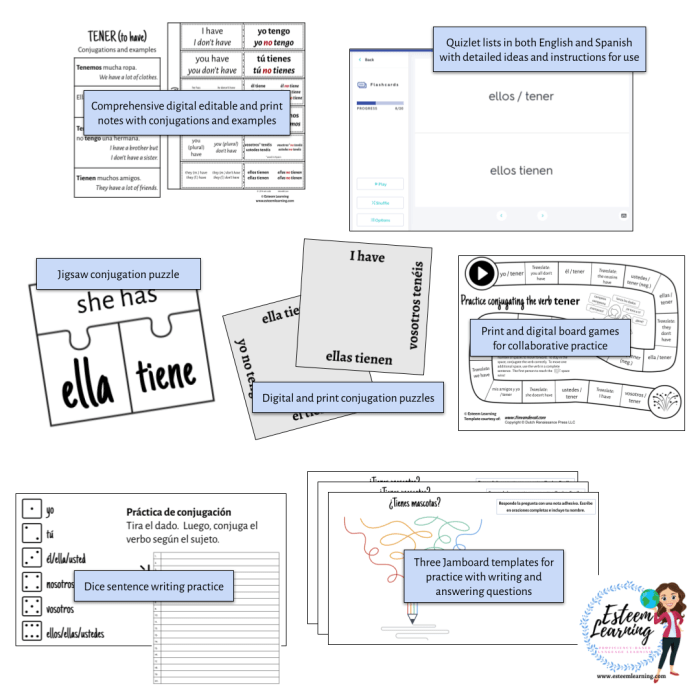Embark on a linguistic adventure as we delve into the intricacies of “gramatica c the verb tener,” the Spanish verb “to have.” From its diverse uses to its subtle nuances, this guide will equip you with a comprehensive understanding of this fundamental verb.
Unravel the complexities of “tener” as we explore its conjugation, common expressions, and key differences from “haber.” Immerse yourself in a world of Spanish grammar, where clarity and confidence await.
Conjugation of the Verb Tener

The verb tener (to have) is one of the most common verbs in Spanish. It can be used to express possession, obligation, or experience. The following table shows the conjugation of tener in all tenses and moods:| Tense | Mood | Conjugation | Example ||—|—|—|—|| Present | Indicative | tengo | Yo tengo un libro.
(I have a book.) || Preterite | Indicative | tuve | Yo tuve un accidente. (I had an accident.) || Imperfect | Indicative | tenía | Yo tenía un perro. (I had a dog.)
|| Future | Indicative | tendré | Yo tendré una reunión. (I will have a meeting.) || Conditional | Indicative | tendría | Yo tendría una casa. (I would have a house.) || Present | Subjunctive | tenga | Yo quiero que tú tengas un buen día.
(I want you to have a good day.) || Preterite | Subjunctive | tuviera | Yo pensé que tú tuvieras un libro. (I thought that you had a book.) || Imperfect | Subjunctive | tuviera | Yo quería que tú tuvieras un buen día.
(I wanted you to have a good day.) || Future | Subjunctive | tuviere | Yo espero que tú tuvieras un buen día. (I hope that you have a good day.) || Conditional | Subjunctive | tuviera | Yo diría que tú tuvieras un buen día.
(I would say that you have a good day.) || Imperative | Affirmative | ten | Ten cuidado. (Be careful.) || Imperative | Negative | no tengas | No tengas miedo. (Don’t be afraid.)
|
Uses of the Verb Tener: Gramatica C The Verb Tener

The verb “tener” is one of the most versatile verbs in Spanish, with a wide range of meanings and uses. Here are some of the most common uses of “tener”:
Possession
“Tener” is used to express possession, meaning “to have” or “to own.” For example:
- Tengo un coche. (I have a car.)
- ¿Tienes dinero? (Do you have money?)
Existence
“Tener” can also be used to indicate the existence of something. In this sense, it means “to have” or “to there be.” For example:
- Tenemos muchos problemas. (We have many problems.)
- ¿Hay alguien ahí? (Is there anyone there?)
Age
“Tener” is used to express age in Spanish. The construction is “tener + age + años.” For example:
- Tengo treinta años. (I am thirty years old.)
- ¿Cuántos años tienes? (How old are you?)
Obligation
“Tener” can be used to express obligation or necessity. In this sense, it means “to have to” or “to must.” For example:
- Tengo que estudiar para el examen. (I have to study for the exam.)
- ¿Tienes que ir a la tienda? (Do you have to go to the store?)
Characteristics
“Tener” can also be used to describe characteristics or qualities of people or things. In this sense, it means “to have” or “to possess.” For example:
- Tengo hambre. (I am hungry.)
- El libro tiene muchas páginas. (The book has many pages.)
Common Expressions with Tener

The verb tener has several common expressions that are used in everyday Spanish. These expressions often convey different meanings and nuances beyond the literal translation of the verb “to have.”
Tener Hambre
The expression tener hambreliterally means “to have hunger.” It is used to express the feeling of being hungry or needing to eat.
Tengo mucha hambre. (I’m very hungry.)
Tener Sueño
The expression tener sueñoliterally means “to have sleep.” It is used to express the feeling of being sleepy or needing to sleep.
Tengo mucho sueño. (I’m very sleepy.)
The verb “tener” is a versatile verb in Spanish grammar, used to express possession, age, and other concepts. It’s also a key component in understanding the fraternal organization Kappa Alpha Psi Phi Nu Pi . Returning to grammar, the verb “tener” can be conjugated in various forms, making it an essential tool for effective Spanish communication.
Tener Razón
The expression tener razónliterally means “to have reason.” It is used to express agreement or to indicate that someone is correct.
Tienes razón. (You’re right.)
Tener Cuidado
The expression tener cuidadoliterally means “to have care.” It is used to express caution or to warn someone to be careful.
Ten cuidado. (Be careful.)
Differences between Tener and Haber

The verbs tenerand haberare often confused because they both can mean “to have.” However, there are some key differences between the two verbs.
Teneris used to express possession or ownership. It can also be used to express a characteristic or quality.
Haberis used to express existence or occurrence. It can also be used to form the perfect tenses of other verbs.
Examples, Gramatica c the verb tener
- Tengo un coche.(I have a car.)
- Tienes ojos azules.(You have blue eyes.)
- Hay un libro sobre la mesa.(There is a book on the table.)
- He comido.(I have eaten.)
Top FAQs
What are the different uses of “tener”?
Tener can express possession, existence, age, obligation, and characteristics.
How do I conjugate “tener” in the present tense?
Yo tengo, tú tienes, él/ella/usted tiene, nosotros/as tenemos, vosotros/as tenéis, ellos/ellas/ustedes tienen.
What is the difference between “tener” and “haber”?
Tener indicates possession or a state of being, while haber is used for existence, past actions, or obligation.
